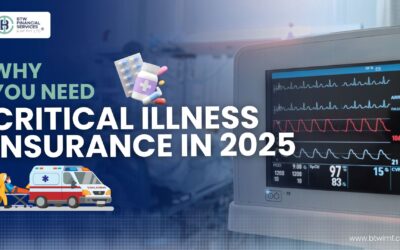5 Reasons Health Insurance Claims Get Denied & How to Avoid Them
Summary
- 5 Key Reasons for Health Insurance Claim Denials in India:
- Inaccurate/Incomplete Documentation
- Non-Disclosure/Waiting Period for Pre-Existing Diseases
- Non-Coverage of Specific Treatments/Conditions
- Non-Network Hospital Treatment
- Delayed Claim Intimation/Submission
- Proactive Approach: Understand policy terms, maintain accurate documentation, disclose medical history, and adhere to timelines to minimize denial risks.
- Additional Tips: Regular policy reviews, utilizing IRDAI grievance redressal for unjust denials, and consulting insurance advisors for personalized guidance.
Table of Content
- Introduction
- 1. Inaccurate or Incomplete Documentation
- Reason for Denial
- How to Avoid It
- Additional Tips
- 2. Pre-Existing Disease (PED) Non-Disclosure or Waiting Period
- Reason for Denial
- How to Avoid It
- Key Considerations
- 3. Non-Coverage of Specific Treatments or Conditions
- Reason for Denial
- How to Avoid It
- Policy Enhancement Strategies
- 4. Non-Network Hospital Treatment
- Reason for Denial
- How to Avoid It
- Utilizing Network Hospitals Effectively
- 5. Timely Claim Intimation and Submission
- Reason for Denial
- How to Avoid It
- Streamlining Your Claim Process
- Additional Tips for Indian Policyholders
- Grievance Redressal for Unjust Denials
- Conclusion
Introduction
Health insurance serves as a crucial financial safeguard against unforeseen medical emergencies in India. However, the claim process, which is pivotal in utilizing this safeguard, can sometimes be marred by denials. These denials not only delay the much-needed financial assistance but also add to the policyholder’s stress during an already challenging time.
Understanding the common reasons behind these denials is the first step towards navigating the system more effectively. This guide delves into the 5 primary reasons why health insurance claims are denied in India, offering detailed advice on how to avoid such outcomes.
The Insurance Regulatory and Development Authority of India (IRDAI) also recently reported that 11% of health insurance claims were denied in FY24, totaling ₹26,000 crore in repudiated claims.
1. Inaccurate or Incomplete Documentation
Reason for Denial:
Submission of incomplete, inaccurate, or unsigned claim forms and supporting documents is a prevalent reason for claim denials. This oversight can lead to significant delays or even outright rejections, as insurers rely heavily on the accuracy and completeness of the provided information to process claims.
How to Avoid It:
- Thoroughness is Key: Ensure all claim forms are meticulously filled, signed, and dated. A single overlooked field or missing signature can lead to complications.
- Document Checklist: Always request and follow the insurer’s checklist of required documents to avoid missing any critical paperwork. Common documents include hospital bills, discharge summaries, and diagnostic reports.
- Digital Record Keeping: Maintain digital copies of all submitted documents for easy reference and to facilitate any future communications with the insurer.
Additional Tips:
- Double-Check Contact Information: Ensure your contact details (phone number, email, etc.) are up-to-date to receive timely updates on your claim status.
- Follow Up: If submitting documents in person or via post, obtain a receipt or tracking number to verify delivery.
2. Pre-Existing Disease (PED) Non-Disclosure or Waiting Period
Reason for Denial:
Claims related to pre-existing diseases (PEDs) that were either not disclosed at the time of policy purchase or fall within the specified waiting period are commonly denied. Insurers typically have a waiting period (ranging from 2 to 4 years) before covering PEDs to manage risk.
How to Avoid It:
- Transparency at Purchase: Always disclose your complete medical history when buying a policy. Non-disclosure can lead to claim denials or even policy cancellation.
- Understand Your Policy Terms: Be aware of the waiting period for PEDs and plan your medical expenses accordingly. Some insurers offer shorter waiting periods or provide coverage for PEDs at an additional premium.
Key Considerations:
- Continuous Coverage: Maintaining continuous coverage can reduce the waiting period for PEDs if you switch insurers.
- Top-Up/Cover Enhancement: Consider enhancing your coverage after the waiting period to include specific PEDs.
3. Non-Coverage of Specific Treatments or Conditions
Reason for Denial:
Claims for treatments, conditions, or items explicitly excluded under the policy terms are denied. These exclusions can range from cosmetic surgeries to alternative therapies.
How to Avoid It:
- Policy Review: Before purchasing or renewing, thoroughly read and understand what is covered and excluded. Insurers often provide a list of exclusions in the policy document.
- Policy Upgrades: If needed, consider upgrading your policy to include additional coverage for specific conditions or treatments, possibly at an additional premium.
Policy Enhancement Strategies:
- Riders and Add-ons: Explore available riders or add-ons that can enhance your policy’s coverage to match your evolving health needs.
- Compare Policies: When renewing, compare your current policy with others in the market to ensure you have the best coverage for your needs.
4. Non-Network Hospital Treatment
Reason for Denial:
Seeking treatment at hospitals not part of the insurer’s network can lead to issues with cashless claims or reimbursement delays.
How to Avoid It:
- Network Verification: Always verify if your preferred hospital is within the insurer’s network before admission, especially for planned treatments.
- Planned Treatments: For non-emergency procedures, opt for network hospitals to utilize the cashless facility, streamlining your financial process.
Utilizing Network Hospitals Effectively:
- Emergency Situations: In emergencies, prioritize your health and seek immediate care. Later, contact your insurer for guidance on the next steps for reimbursement.
- Network Hospital Benefits: Apart from cashless treatments, network hospitals often provide streamlined claim processes.
5. Timely Claim Intimation and Submission
Reason for Denial:
Failure to intimate the insurer within the specified timeframe (usually 24-48 hours for emergencies and 48 hours to 7 days for planned hospitalizations) or delayed submission of claim documents can lead to denials.
How to Avoid It:
- Prompt Notification: Inform your insurer immediately after hospitalization, adhering to the specified timelines.
- Organized Submission: Keep track of deadlines for submitting claim documents to ensure timely reimbursement. Use the insurer’s checklist to avoid missing any documents.
Streamlining Your Claim Process:
- Insurer’s Claim App/Portal: Utilize the insurer’s mobile app or online portal for claim intimation and document submission for a more efficient process.
- Dedicated Claim Handler: If assigned, maintain regular contact with your dedicated claim handler for updates and assistance.
Additional Tips for Indian Policyholders
- Regular Policy Reviews: Periodically assess your policy to ensure it aligns with your changing health needs and financial situation.
- IRDAI Grievance Redressal: For unjust claim denials, utilize the Insurance Regulatory and Development Authority of India (IRDAI) grievance redressal mechanisms.
- Consult Insurance Advisor: Personalized Guidance for Best Health Insurance for Senior Citizens in India.
Grievance Redressal for Unjust Denials
In case of an unjust claim denial, follow these steps:
- Insurer’s Internal Ombudsman: Approach the insurer’s grievance redressal cell.
- IRDAI’s Insurance Ombudsman: If unresolved, file a complaint with the IRDAI’s Insurance Ombudsman.
- Insurance Ombudsman Councils: For further escalation, contact the Insurance Ombudsman Councils located across India.
Conclusion
Navigating the health insurance claim process in India requires a proactive and informed approach. By understanding and addressing these common denial reasons, policyholders can significantly reduce the likelihood of claim denials, ensuring a smoother and more supportive experience during medical emergencies.




